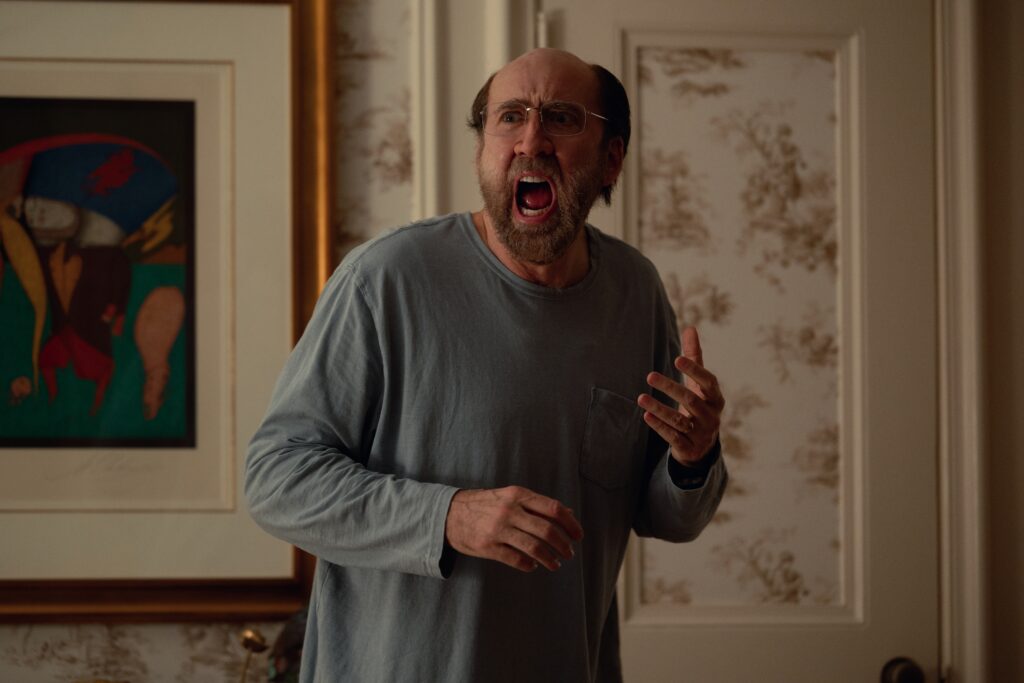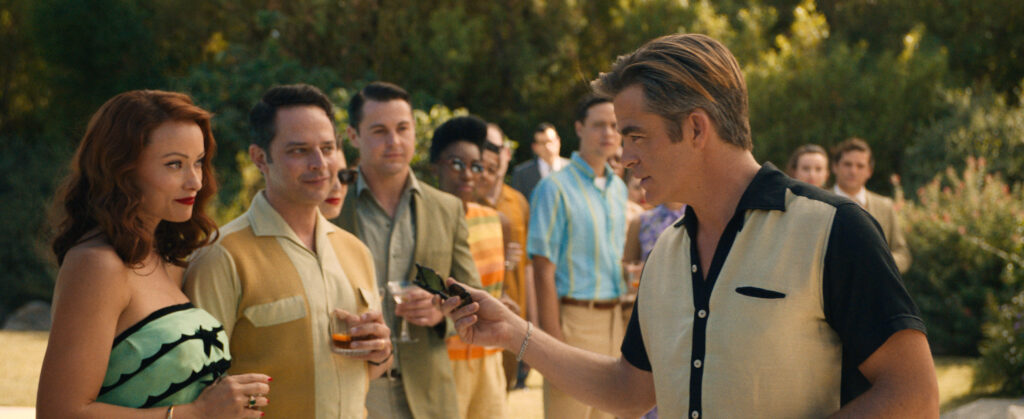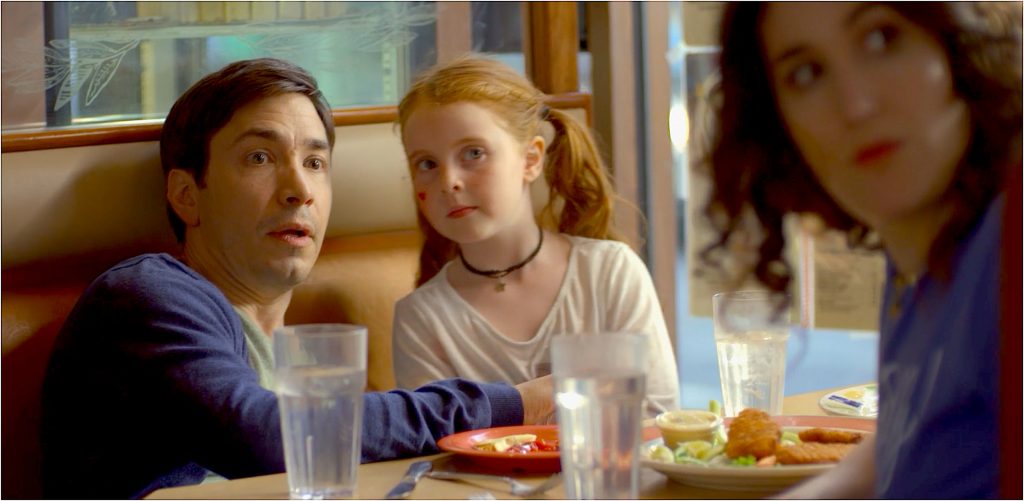November 9, 2023
by Carla Hay

Directed by Kristoffer Borgli
Culture Representation: Taking place in unnamed U.S. cities, the sci-fi comedy/drama film “Dream Scenario” features a predominantly white cast of characters (with a few African Americans, Latinos, Asians and one Native American) representing the working-class and middle-class.
Culture Clash: An insecure college professor finds out that he’s appearing in the dreams of millions of people around the world, and he experiences the positives and negatives of fame.
Culture Audience: “Dream Scenario” will appeal primarily to people who are fans of star Nicolas Cage and movies that take satirical looks at how public images and fame can be used and exploited.

“Dream Scenario” offers interesting ideas about fame and the power of perception versus reality. Although the ending of this satirical comedy/drama is a little too rushed, there’s enough in the movie to keep viewers guessing on what will happen next. It’s a big concept for “Dream Scenario,” which sometimes bites off more than it can chew on this concept.
Written and directed by Kristoffer Borgli, “Dream Scenario” had its world premiere at the 2023 Toronto International Film Festival. “Dream Scenario” has some plot elements that were science fiction at the time this movie was filmed and released in the early 2020s, but some of the fictional technology shown in the movie could very well become a reality. That futuristic possibility is what holds this movie together in its intention to be provocative as well as entertaining, because some parts of “Dream Scenario” start to wear thin and almost fall apart.
The protagonist of “Dream Scenario” (which takes place in unnamed U.S. cities) is Paul Matthews (played by Nicolas Cage) a nerdy and insecure professor who teaches biology at the fictional Osler University. “Dream Scenario” was actually filmed in Toronto. Paul (who has a background in ocean biology) and his wife Janet (played by Julianne Nicholson) have been married for 15 years and have two teenage daughters: Hannah Matthews (played by Jessica Clement) is about 15 or 16, and Sophie Matthews (played by Lily Bird) is about 13 or 14.
One day, Sophie tells Paul that he was in one of her recent dreams, where he stood by while objects crashed from the sky into their swimming pool and Sophie floated in the air. The opening scene of “Dream Scenario” shows this particular dream. Paul doesn’t think too much about it, but he thinks it’s curious that Sophie says that Paul has been dreaming about him frequently. He also wonders out loud why he was just a passive bystander in the dream.
Later that day, Paul has lunch with a former graduate school classmate named Sheila Harper (played by Paula Boudreau), who tells Paul that she’s about to publish a research about ant intelligence or “antelligence” that will be published in a magazine called Nature. (Sheila’s research paper is titled “Antelligence Theory.”) The problem for Paul is that this research sounds a lot like his ideas that he talked about with Sheila when they were grad students, but she had no interest in those ideas at the time.
Paul is miffed and a little jealous that Sheila is now getting a research paper published for ideas that he thinks she “stole” from him. Sheila believes that she doesn’t have to give Paul any credit, because she genuinely developed an interest in the research paper’s topic. Their conversation has some tension. Paul and Sheila don’t seem interested in seeing each other again after this somewhat uncomfortable encounter.
Not too long after that lunch meeting, Paul and Janet go to see a play. After the play is over, another audience member sees Paul in the hallway and gives him a warm hello. Her name is Claire (played by Marnie McPhail), who used to date Paul years ago. It’s the first time that Janet has met Claire. Paul tells Janet right away that Claire is an ex-girlfriend.
Claire has something unusual to tell Paul: She has been dreaming about him. In her dreams, she is in danger while he is just a bystander observer. Claire invites Paul to lunch to discuss it further. During their lunch meeting, Claire says she writes for a pyschology online publication called New Inquiry, and she wants to do an article about her dreams about Paul, who willingly gives her permission to write about him.
Soon after this article is published, Paul starts getting hundreds of social media messages from strangers , who all say that Paul is in their dreams too. This is how Paul finds out that Claire’s article included a link to his social media accounts. Paul then becomes a media sensation, as the numbers of people who dream about him grow into the millions, including many people he knows, such as his students and friends. Paul is overwhelmed but flattered by all the attention.
One person who hasn’t been dreaming about Paul is Janet. When he asks Janet what her dream/fantasy about him would be, Janet says she sometimes has a fantasy that she is in danger somewhere, and Paul comes to her rescue, wearing a Halloween costume that Paul had years ago: a replica of the oversized suit that singer David Byrne wore in the Talking Heads’ 1984 concert documentary “Stop Making Sense.”
Paul’s fame attracts a mentally ill man named Tristan (played by Jim Armstrong), who breaks into the Matthews home at night while carrying a knife and threatening to kill everyone in the house. The intruder is apprehended without resistance. Paul and Janet later find out from an investigator that the intruder was having a “manic” episode and meant no harm. Still, the investigator advises Paul and Janet to beef up their security, such as getting alarms and learning self-defense.
Janet is worried about what Paul’s fame will do to him and their family, but Paul wants to cash in his fame while he still has it. He has a meeting with a trendy start-up marketing agency called Thoughts, which is led by Trent (played by Michael Cera) and Mary (played by Kate Berlant), who are smarmy entrepreneurs willing to say and do anything to make money. The executives at Thoughts initiated the contact with Paul, who is ignorant about marketing and advertising.
Paul has to go out of town to meet these executives for the first time at Thoughts headquarters. The first person he meets in the office is Molly (played by Dylan Gelula), the assistant of Trent and Mary. Molly sits in on the meeting. Paul tells Trent and Mary that the first thing he wants Thoughts to do for him is help Paul get a book deal. However, Trent and Mary are more interested in signing up Paul to do advertising for Sprite. Trent and Mary are eventually able to convince a reluctant Paul to go along with their plans.
“Dream Scenario” takes a few unexpected turns which are hit and miss for this story. It’s enough to say that whatever Paul does in people’s dreams greatly affect their perception of who he is in real life. Something changes when Paul finds out that Sheila is getting praise and media attention for her research paper. And then, things get ugly when people start having violent nightmares about Paul.
“Dream Scenario” cleverly lampoons the fickle nature of fame and how people think they “know” a celebrity they’ve never met. The movie features several sequences of how Paul appears to people in their dreams. Many of these sequences are amusing, but some are very menacing and are meant to be unsettling. When things start to go very wrong for Paul, he gets some sympathy and advice from Osler University dean Brett (played by Tim Meadows) and Matthews family friend Richard (played by Dylan Baker), but their friendship limits are tested as Paul’s life starts to get out of control.
Cage (who is one of the producers of “Dream Scenario”) gives a wide-ranging and very watchable performance, because Paul goes through some extreme experiences. “Dream Scenario” is a dark comedy that takes an “ordinary” person and puts that person in extraordinary circumstances. The supporting cast members are also quite good in their roles, but this movie rises or falls mainly on Cage’s talent of being realistically comedic in absurd situations. Some viewers might not like how the movie ends, but the last scene in the movie is entirely consistent with the bittersweet message that “Dream Scenario” is trying to convey about how people use reality and fantasy in their lives, for better or worse.
A24 will release “Dream Scenario” in select U.S. cinemas on November 10, 2023, with an expansion to more U.S. cinemas on November 22, 2023.



